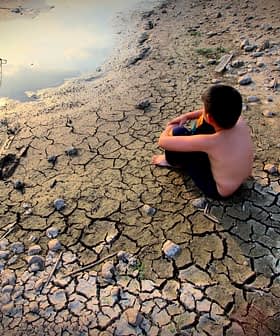Temperatures Rising Faster in Europe than Anywhere Else, Report Finds

A new report from the World Meteorological Organization and the European Union’s Copernicus Climate Change Service shows that temperatures in Europe have increased two-fold compared to the global average over the past three decades. Climatologists are not surprised by this trend, which is due to factors such as the distribution of land and sea, and warn of significant consequences including heatwaves, water scarcity, and wildfires.
Temperatures in Europe are rising faster than on any other continent, according to a new report from the World Meteorological Organization (WMO) and the European Union’s Copernicus Climate Change Service.
The report found that average annual temperatures in Europe have increased two-fold compared to the global average of the past three decades. Officials worry that continuing this trend will threaten European communities’ health and hurt the economy and environment.
In the long run, Europe will have to face the increasing frequency of heatwaves, growing water scarcity and sea level rise. Those are the three variables most impacting the continent, its population and agriculture.
However, the above-average temperature rise experienced in Europe does not surprise climatologists.
“Global warming does not follow the same patterns all around the planet,” Gianmaria Sannino, a climatologist at the Italian National Agency for New Technologies, Energy and Sustainable Economic Development (ENEA), who was not directly involved in the study, told Olive Oil Times.
See Also:Greenhouse Gas Emissions Hit Record Highs in 2021“It depends on many factors, such as the distribution of land and sea, as the sea can absorb heat way more than land,” he added. “This is among the reasons the northern hemisphere tends to become warmer than the southern.”
The 2021 State of Climate in Europe report found that temperatures increased 0.5 ºC each decade from 1991 to 2021. While this sounds like a relatively minor increase, climatologists warned that it has and will have significant consequences.
“Surface temperatures are increasing as the heat is trapped in our atmosphere by the greenhouse gases,” Sannino said. “That heat is energy. A huge quantity of energy, equal to five Hiroshima atomic bombs, detonated in the atmosphere every second for the last 40 years.”
Extraordinarily warm temperatures coupled with changing rainfall patterns and lower volumes of precipitation are among the causes of the ongoing drought, which is one of the most relevant impacts of climate change in Europe.
The WMO report found that precipitation deficits since 2018 have been recorded across Europe, with a more significant impact on the Iberian Peninsula and the Alps.
“In Europe, we are seeing a systematic reduction of precipitation,” Sannino said. “In the long run, Europe will have to face the increasing frequency of heatwaves, growing water scarcity and sea level rise. Those are the three variables most impacting the continent, its population and agriculture.”
The WMO reported how dry conditions coupled with repeated heatwaves in southern Europe resulted in devastating wildfires in Italy, Greece and Turkey, three major olive oil-producing countries.
In 2021, wildfires burned three times more area than the 2006 to 2020 average across southern Europe and the Levant.
“Most damage from wildfires is due to extreme events that represent less than 2 percent of the total number of fires,” the WMO report said. “These events, for which neither ecosystems nor communities are adapted, can have significant socioeconomic and ecological consequences.”
“Climate change, human behaviors and other underlying factors are creating the conditions for more frequent, intense and devastating fires in Europe,” the report added.
Along with the impacts of wildfires, climate change has a profound effect on European agriculture, mainly related to changing precipitation patterns and rising temperatures.
Citing data from the United Nations’ Food and Agriculture Organization (FAO), the WMO said climate change has resulted in shorter harvesting periods arriving at different moments of the year and changes to the planting season.
For example, the WMO cited the cold snap in the spring of 2021, which caused widespread damage to a range of crops across France and Italy, including olive trees.
“Climate change leads to economic impacts which translate into a loss of livelihoods, reduced agricultural production and productivity, adverse effects on food availability and food access, and loss of income, which can contribute to food insecurity and lead to hunger and malnutrition,” the report said.
The report further found that changes to the jet stream, an air current that blows from west to east in the Northern Hemisphere, are among the most relevant drivers of climate change in Europe.
“This river of high-speed air flowing at eight or nine kilometers above the surface is a conveyor belt that determines meteorological conditions at middle latitudes,” Sannino said. “It is affected by climate change, and it is now making it easier for hot air from Africa to come up to Europe more often, impacting the local temperature.”
Among the effects of the climate crisis is the changing distribution, incidence and intensity of animal and plant pests and diseases. European farmers, including olive growers, have borne the brunt of these changes, with some struggling to cope with the incidence of new invasive species.
Bacteria such as the Xylella fastidiosa and insects such as the marmorated stink bug or the Japanese beetle have dramatically impacted food production and the landscape in Europe.
The report found that 84 percent of the extreme weather events reported in the continent were floods or storms, which directly affected more than 510,000 people, resulting in hundreds of fatalities and more than €48 billion of economic damage.
Sannino said atmospheric greenhouse gas concentrations fuel these extreme events.
“The climate system has so much more energy to use, and that brings destabilization in the atmosphere, which starts acting in atypical ways,” he said. “Those might be relatively small variations, but they are sufficient to significantly alter the meteorological conditions we have been used to in the last 30 or 40 years.”
For centuries, the Mediterranean basin experienced very specific and stable weather conditions, which have been highly beneficial for farming.
“It has been special compared to the rest of the world,” Sannino said. “It was a favorable and highly predictable climate. Farmers knew how the seasons would unfold. We still have a special climate, but such uniqueness relates to faster and more evident climate change.”
The report also found that greenhouse gas emissions of the E.U. members have been reduced by 31 percent from 1990 to 2020, with a 35-percent reduction target before 2030. In other countries in the region, the 2030 reduction targets range from 35 to 55 percent compared with 1990.
“On the mitigation side, the good pace in reducing greenhouse gas emissions in the region should continue, and ambition should be further increased,” said Petteri Taalas, WMO secretary-general, while introducing the report.
“Enhanced ambition would demand that Europe plays a key role toward achieving a carbon neutral society by the middle of the century, a necessary requirement to limit the global temperature increase to well below 2 ºC while pursuing efforts to limit the increase to 1.5 ºC, as specified in the Paris Agreement,” he added.









